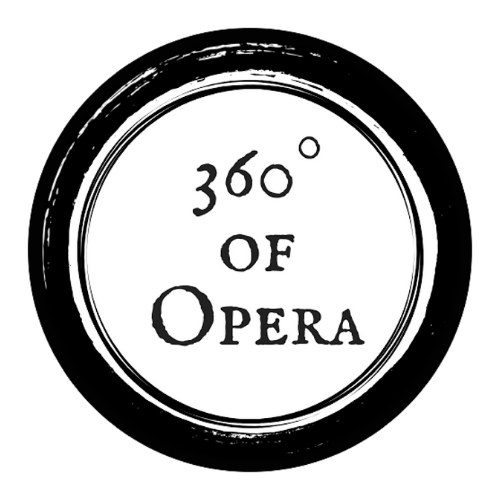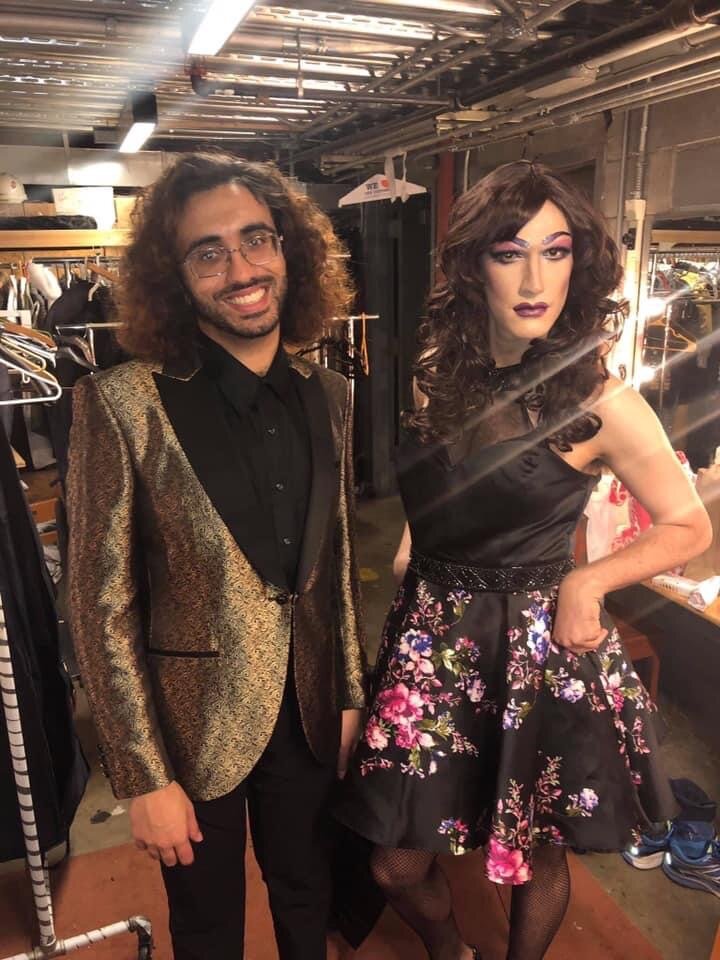Pride Month Spotlight: Queering the Classic
Photo Credit: Stephanie GrossAn exclusive #360ofOpera interview with composer and pianist Felix Jarrar, written by Yutong Yang.
Felix Jarrar (he/him) was one of the first artists Eugenia suggested when I approached her with my idea of doing “something nice and special” for Pride Month. It was recess, and I had been raving about “The Raven” with my mentor, who happens to share my adoration for Edgar Allan Poe. You can tell how surprised and curious I was when I checked out Felix’s page and found that he was adapting Poe’s “The Tell-Tale Heart.”
Well, he wasn’t just adapting it … He was queering it. And from the description, I sensed that the opera was going to be a perfect combo of psychological thriller, romance, and an angsty attempt at subverting the patriarchy. You dig? I did.
A thorough watch of the genre-busting adaptation confirmed that it was exactly what I fancied, and so much more—but I won’t spoil the suspense for you, because it’s definitely worth seeing for yourselves!
After low-key stalking Felix’s website, I knew I just had to invite him to this series, and he said yes! So, without further ado, let’s dive right into my conversation with Felix! As per usual, here’s the origin story——
Photo Credit: Orlando Mendiola1. You composed your first opera when you were 15, and your sister Petra (@soundslikepetra) writes and sings electropop. I guess we can say it runs in the family! Has music always been a big thing growing up?
Music has always been my central love in life. Neither of my parents were musicians. We had a neighbor with a piano, and when I was a toddler I would always force them to stop by their house so that I could play the piano. They ended up getting me an upright Yamaha, which I still use to this day. I started playing the piano and composing when I was 5. I was also a ballet dancer and was very inspired by ballet music. The first piece of music I ever wrote was called The Firebird (take that, Stravinsky!)
Felix Jarrar with his sister, Petra Jarrar.2. We admire your works for voice a lot, and you seem to have some stellar pieces for every Fach! What makes the human voice unique to you?
Thank you very much! What makes the voice unique to me is that it's the most purely human form of expression in sound. It's an instrument that comes from literally inside of us. There is no more organic expression than that.
3. Do you think of the voice as an instrument?
I don't think of the voice as an instrument such as piano, violin, clarinet, or trumpet. I separate the way I write for voice from these instruments because I have to specifically think about scansion, text-setting, breathing, tessitura, and a whole bunch of singer-specific things that us instrumentalists never have to deal with.
4. Is there a particular Fach you enjoy working with?
I tend to reject the idea of the Fach system. I write for specific singers, not a standard "voice-type". The fach system was developed long after many of the pieces of standard repertoire were written. Composers from the past always wrote operas for specific singers who would create the part. Not every singer in a Fach will have the same facility or access to everything as others. Sometimes, their strengths may lie between two different Fächer. I work with a lot of dramatic voices and singers who have full instruments. I love the color and depth of the tone they can bring to my work. It's very challenging to record these livestreams with such voices, but we find a way to make it work!
Photo Credit: Stephanie Gross5. Many songs of yours are named after colors: “Blue,” “Red is Self Love,” “Yellow” … How do colors speak to you and inspire your works?
Colors inspire me in a multitude of ways. I love associating different moods with different colors. Lyricist/Librettist Bea Goodwin (@be_goodwin), my brilliant collaborator, wrote the text for "Blue", the opening aria from our jazz opera Tabula Rasa. “Red is Self Love” and “Yellow” are two art songs that I wrote the music and lyrics for about a particularly difficult romantic relationship. I use the colors of the pride flag, and the different meanings of these colors.
Felix Jarrar and Bea Goodwin, photo by Orlando Mendiola.6. We all adore Bea, and absolutely can’t get enough of your collabs! Could you please share a bit on how you work together?
Bea and I have a collaborative relationship that can best be described as psychic. Most of the time, the lyrics come first, and after she sends them I'll text her a voice memo of the motive I'm developing based on the text. This is how "Blue" came to be. We were in tech week for our song cycle Songs of the Soul Beams at BAM (Brooklyn Academy of Music) and I got a text from her with the lyrics for "Blue". She then sent me a picture of Kiki de Montparnasse and told me that she wanted to write an opera about her relationship with Man Ray.
The cast of Tabula Rasa at The Blue Building in NYC. Photo by Lucas Godlewski.7. From The Fall of the House of Usher to The Tell Tale Heart, Poe seems to be an inspiration you keep returning to. How do you relate to him and/or his style?
I fell in love with composing opera because I saw The Fall of the House of Usher as a play when I was 11 and wanted to adapt it. I had just seen Mozart's Le Nozze di Figaro, which was my first opera. I am attracted to the interpersonal drama and subtext of Poe's stories, and musically explore these stories as psychological studies. I have also adapted “The Oval Portrait” and “The Cask of Amontillado” as chamber operas.
8. Why did you decide to queer “The Tell Tale Heart,” instead of taking a more conventional approach or, say, queering Medea?
I decided to queer the “The Tell Tale Heart” because there's nothing in the story to suggest that the Narrator is NOT queer or femme. I wanted to write from my experience as a gay POC male artist to bring a new perspective to this classic tale.
9. There seems to be this debate amongst queer creators: Some people think the exigency is to celebrate our queerness or to portray the ordeals queer people go through because of our identities, while others argue it’s better to have queer characters who just happen to be queer and live their lives just like anyone else. Which side might you take?
I write works with queer narratives that utilize several sources of inspiration. The first is autobiographical. Many of my songs in song cycles such as The Ulster County Songbook and Happy (I wrote the text and music for both) are very explicitly personal and concern a lot of my life between the ages of 17 - 25. I also write works that recontextualize narratives that we traditionally accept as straight. Then I have works like Mother Goose which celebrate the queer community instead of focusing on its trauma. I feel like anything in life a balance is needed, but we need less works in the canon that exclusively focus on the community's trauma.
Photo Credit: Stephanie Gross10. We’d love to hear more on your drag opera! How did it come to be?
I composed the libretto and score for Mother Goose based on a short story I wrote as a teenager. I wrote this opera because I wanted a work that celebrated the diversity of the queer community without embracing communal trauma.
11. What’s the most special thing about Mother Goose, in your opinion?
It's an opera that's a fairy tale for adults, and there was nothing else like it out there when I wrote it. This proved to be difficult when explaining to industry people how fairy tale characters could utilize adult themes, language, queer culture, and comedy. It's an opera that is as much home in a theater as it would be in a gay bar, an open air pride concert, or a pop-up show during a queer festival. This is in no small part thanks to Bea Goodwin's production. I am all about bringing opera out of the houses and to the people, and Mother Goose is an example of this goal. The cast, ensemble, and production team for the 2019 premiere predominantly featured people of color, and I am proud of the fact that my work as a writer, composer, or collaborator with Bea has always and will always continue to propel underrepresented voices in our art form to the forefront.
Felix Jarrar and Jonathan Harris (Fairy Godmother) backstage at the premiere of Mother Goose in NYC.12. What does representation mean to you? How do you uplift the voices of queer singers?
I believe in representation and it is important to me for queer singers to create art about their community. I have written an opera with Bea Goodwin called HindSight, which is about the events leading up to the Leopold and Loeb Trial. The work is expressly written for queer artists, and the team No Dominion Theatre Co. (@nodominiontheatreco) [Joseph Beutel (@joeybeut), Gabriel Hernandez (@thegabrielenrique), and Eric Umble (@umblemusic)] has assembled reflects this request that Bea made. The work's premiere is TBD (due to COVID-19) but we look forward to sharing the opera when the company is ready to do so!
13. What do you miss the most about pre-COVID performances?
I guess I miss the spontaneity of how pre-COVID performances could be organized. I work in the new music scene which has lots of concerts pop-up all the time! Every week there was some new performance or concert to see. This scene has been totally disseminated with the pandemic.
14. How have you adapted during COVID? Are these changes here to stay post-COVID?
I've been doing live streams on my YouTube channel in the interim, and have been doing virtual recordings, online teaching/coaching, and working on many new musical projects. I think the online component will be here to stay as we move into a post-COVID world. It's been great to connect with artists all across the country and make new collaborations happen that wouldn't have occurred without the pandemic. If there's one silver lining of this trying time, it has been that we can stay connected even if we cannot be in the same room together.
Photo Credit: Stephanie GrossHuge thanks to Felix for reconnecting with us! We can’t wait to share with you what he comes up with next! In the meantime, you can diversify your audition package with an aria from one of Felix Jarrar's operas and support Black Lives Matter at the same time! Learn more about it here.
Next up on 360° of Opera’s Pride Month interview series we have New York’s Most Inspiring (Bumble Inc.) Lucas Bouk (he/him), mezzo-turned-baritone opera singer, and proud artiste presenting “Mr. Liz’s One [wo] Man Show : [living in the in between].” You can find him @mrlucasbouk on Instagram, but please stay tuned for this celebration of self and love! Until next time!
- Yutong Yang










